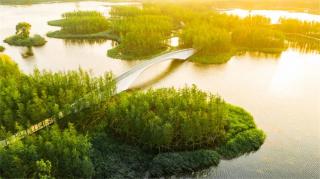南昌市鱼尾洲公园景观设计 | 土人设计
-
项目名称:南昌市鱼尾洲公园
-
项目地点:江西南昌
-
设计公司:
漂浮的森林:南昌市鱼尾洲公园
A Floating Forest: Fish Tail Park in Nanchang City
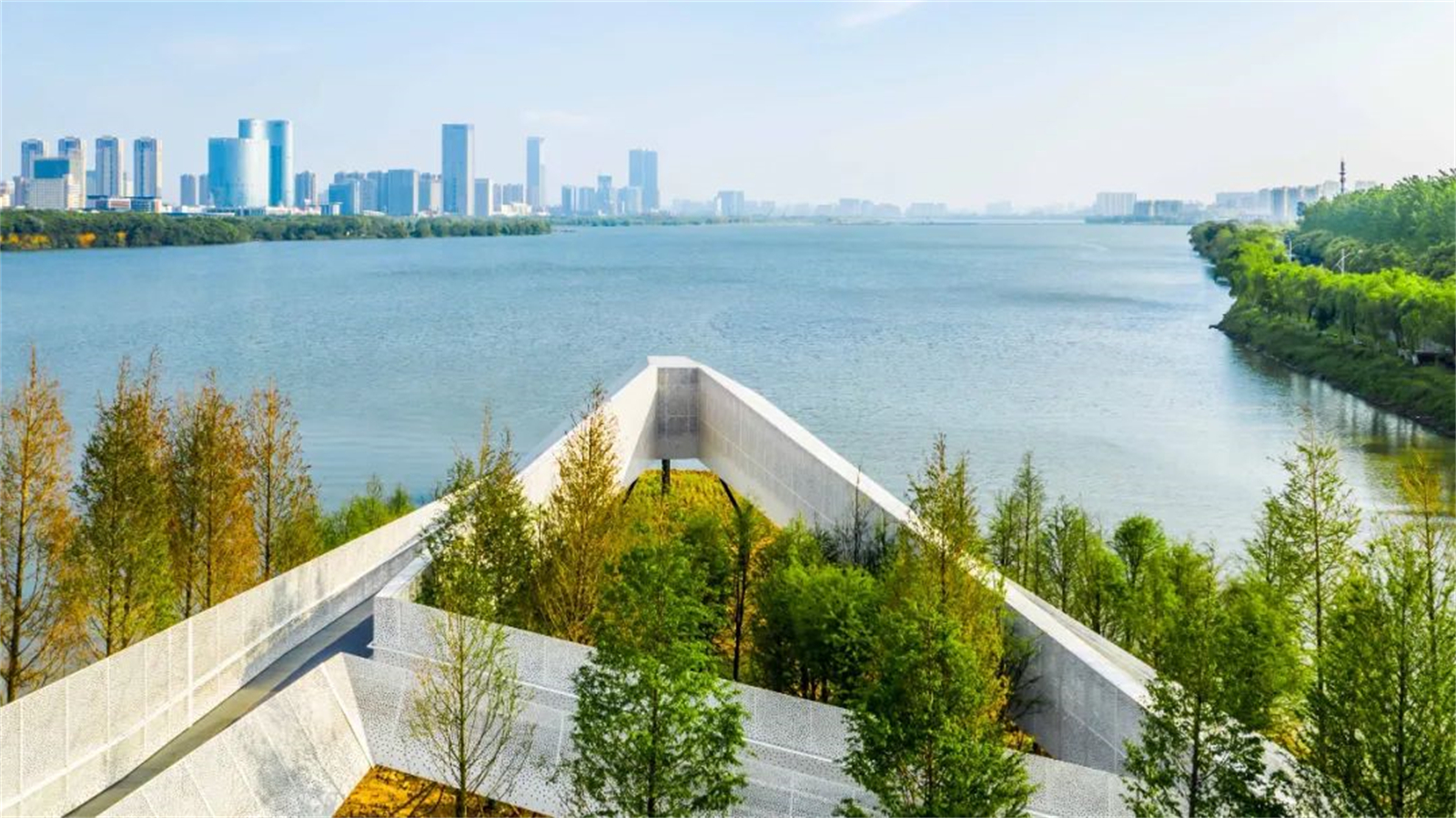
南昌城始建于公元前202年
“物华天宝、人杰地灵”
今日,南昌是江西省省会,
是江西省政治、经济、文化、科技中心、
国家航空、光电产业基地,世界级光伏产业基地。
01 项目说明
A Floating Forest: Fish Tail Park in Nanchang City

在中国中东部长江洪泛平原的南昌市,我们将一片面积126英亩、严重受污染的水产养殖塘改造成了一片梦幻般的漂浮森林。它调节着雨水,为野生动物提供了栖息地,为城市补充了一系列的公共空间,并为当地居民提供了一种与自然联系的新方式。所有这些都赋予了城市新区独特的身份,并促进了周边地区的城市发展。鱼尾洲公园为季风或气候多变的地区提供了一个可复制的城市自然设计的模型,可以应对洪水、栖息地恢复和城市公共休闲需求等多重挑战。该项目是一次景观设计师为城市赋予更大韧性的尝试,旨在表明城市空间不仅可以为人类,也可以为自然灾害的影响(如季风风暴)在城市中开辟新的空间,从而推动关键的自然与人类和谐共处的过程。
In the city of Nanchang, within the Yangtze River flood plain in east-central China, we transformed a 126-acre badly abused landscape into a dreamlike floating forest that regulates storm water, provides habitat for wildlife, offers an array of recreational opportunities and gives local residents a new way to connect with nature. All of this lent a unique identity to the New District and served as a catalyst for urban development in the surrounding area. Fish Tail Park offers a replicable model of designed urban nature for regions with monsoon or variable climates that can address the multiple challenges of floods, habitat restoration and recreational demands. The project is part of a larger effort by the landscape architect to show that it is possible to open up new space in cities not just for people, but also for nature and for the powerful forces, like monsoon storms, that drive critical natural processes.
▼设计前
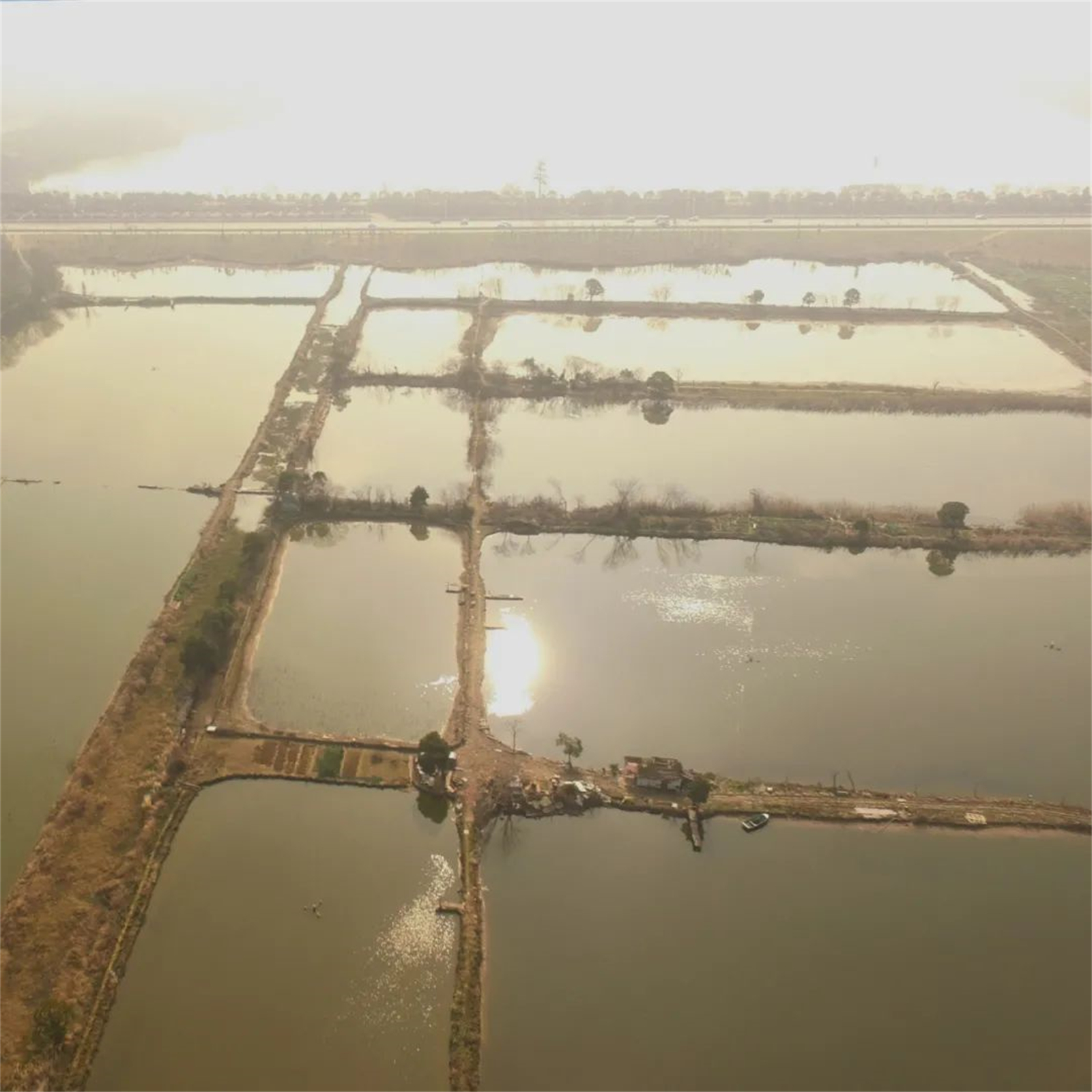
▼设计后

02 现场挑战和目标
Site Challenges and Objectives
南昌是江西省的省会城市,人口超过620万。她是长江中游最大的城市之一,位于中国最大的淡水湖鄱阳湖的西岸。雨季期间,区域洪水和城市内涝一直是该市面临的长期挑战。近年来,由于气候变化和城市快速发展对该地区湖泊和湿地的消极影响,该问题一直在恶化,并大大降低了自然湖泊和湿地的调水能力。与此同时,越来越多的城市径流对地表水造成了日益严重的污染,影响了居民、候鸟和其他野生动物的生活和栖息。大量新的公共空间在这背景下正在设计和建造,以满足不断增长的人口的休闲需求。在这过程中,景观设计和城市化面临的最大挑战和机遇,是如何以低成本、可大规模复制的方式,用综合、集成、高效的解决方案,以解决所有问题。
该项目占地51公顷(126英亩),是从自然湿地中开垦出来的养鱼场,其中大约30%的土地是用于倾倒周围发电厂废料的粉煤灰填埋场。由于粉煤灰的填埋和过度鱼饲料的使用,使城市径流和地表水都受到了严重的污染。而项目周围的区域又计划和进行着密集的城市开发,因此当地政府和开发商都希望利用该公园作为建设整个新区的催化剂。景观设计师将场地面临的挑战视为机遇,决心创造一个有弹性的、城市自然庇护所。该公园将提供多种生态系统服务,包括城市洪水调节、水过滤净化、鸟类和其他野生动物栖息地,以及市民高质量的休闲活动公共空间,并促进城市开发,为许多快速发展的季风城市和地区面临的共同挑战提供可复制的模式和范例。
Nanchang is the capital city of Jiangxi Province and has a population of over 6.2 million people. It is one of the biggest cities in the middle reach of the Yangzi River and is located on the western shore of Poyang Lake, China’s largest fresh water lake. Flooding and urban inundation during the monsoon season has been a chronic challenge for the city. The problem has been worsening in recent years due to the impacts of climate change and rapid development on lakes and wetlands in the area, which has significantly reduced the natural landscape’s water-regulating capacity. At the same time, surface water has been increasingly polluted by growing amounts of urban runoff, impacting the habitat of resident and migratory birds and other wildlife. New public spaces are being designed and built to fulfill the recreational needs of the growing population, but the biggest challenge — and opportunity — for landscape architecture and urbanism is how to develop integrated, efficient solutions to tackle the full spectrum of issues at low cost and in a manner that can be replicable at large scale.
The site is 51 hectare (126 acre) former fish farm reclaimed from a natural wetland. Roughly 30% of the site is a former dump site for coal ash from power plants around the city. The water is polluted due to the coal ash and overuse of fish feed, as well as urban runoff. The area surrounding the site is slated for dense urban development, and both the local government and the developers hope to use the park as a catalyst to develop the entire New District. Seeing the challenges of the site as an opportunity, the landscape architect resolved to create a resilient, natural urban refuge. The park will provide numerous ecosystem services including urban flood regulation, water filtration, habitat for birds and other wildlife, as well as a public space for recreational activities, while catalyzing urban development and providing a replicable model for the shared challenges that many monsoon cities in fast-developing regions are facing.
▼鱼尾洲与城市
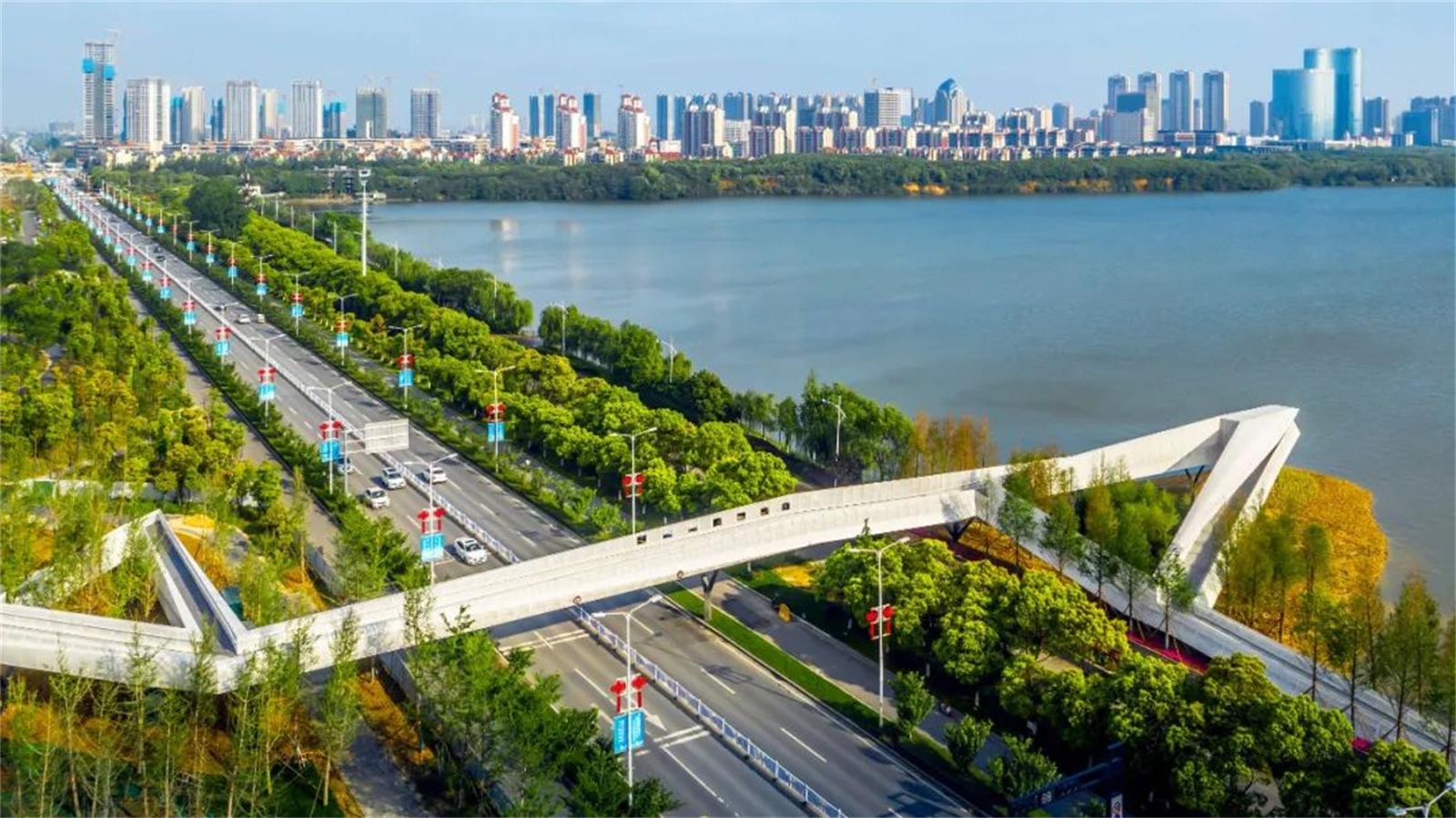
03 设计策略:水上森林
Design Strategy: A Forest on the Water
为了应对所有季风性城市面临的共同挑战和该场地的独特挑战,我们采用了以下设计策略:
To tackle both the common challenges facing all monsoon cities and the unique challenges of this particular site, we pursued the following design strategies:
3.1一个将垃圾场改造成岛链的“宝石湖
Transform an Urban Dumping Ground into an Island-Jeweled Lake
受古代沼泽地上耕作的垛田概念、和Aztec Chinampas简单的挖填技术、以及漂浮花园系统的启发,设计师将倾倒在现场的粉煤灰回收利用,并与鱼塘塘基的泥土掺合,形成了许多小岛。
与此同时,一个能容纳水位上升两米(6.5英尺)的、可蓄滞100万立方米洪水的湖泊被建成。
Inspired by the ancient concept of farming atop marshland, and by simple cut-and-fill techniques such as the Aztec Chinampas, or floating garden system, the coal ash dumped on site was recycled and mixed with dirt from the fish pond dykes to create numerous islets.
At the same time, a lake able to accommodate two meters (6.5 feet) of water-level rise was created, providing the capacity to catch a full 1 million cubic meters of storm water inflow.
▼城市“海绵”
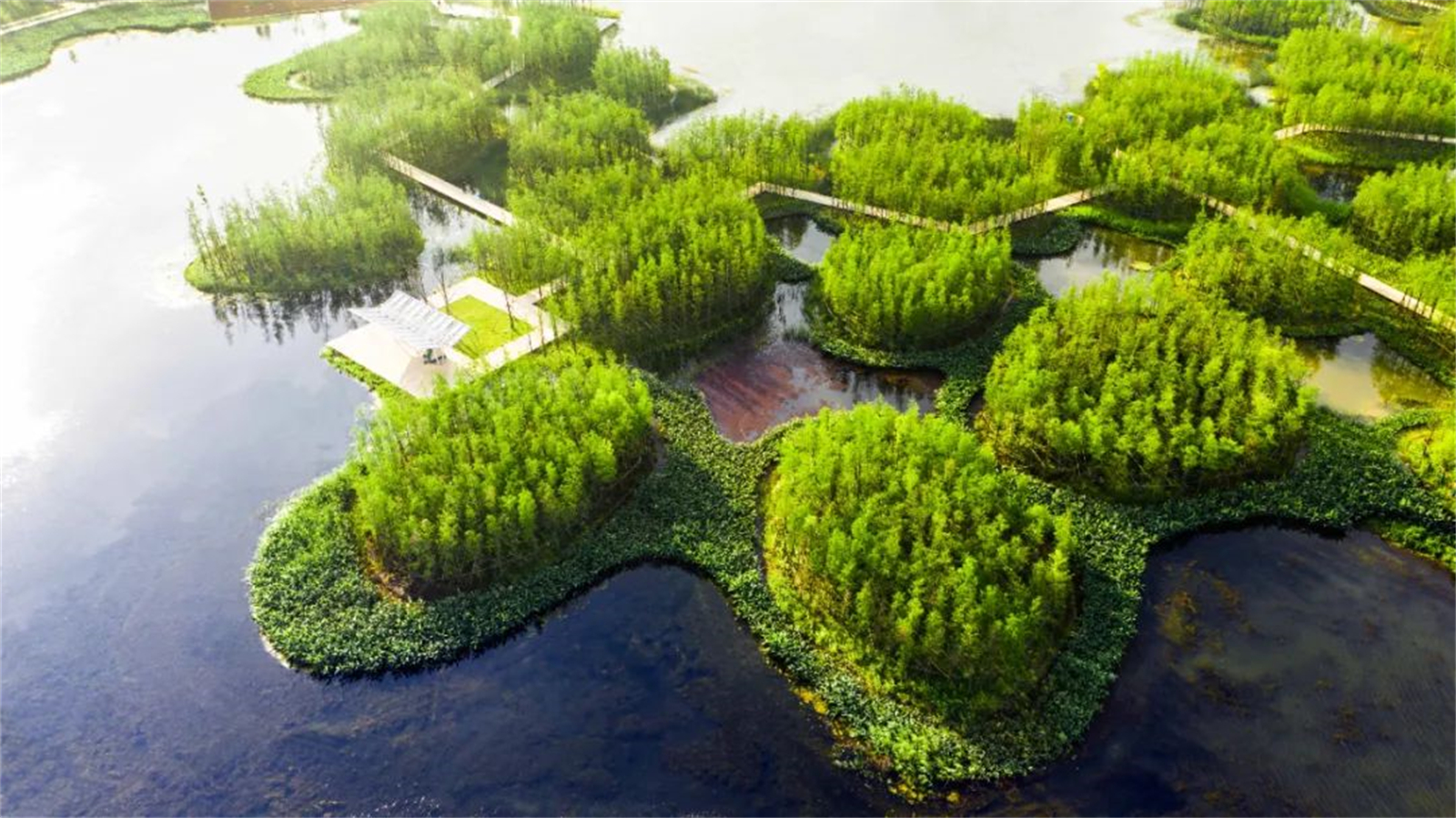
▼雨洪调蓄

3.2一个与水共生的森林核心
A Flood-Adapted Forest Is the Park’s Heart
受鄱阳湖当地季风气候下形成的、洪泛适应性的湖沼湿地启发,我们选择了能够在水位涨落中生存的树种,包括落羽杉、池杉和水杉。由于起伏的水位经常暴露出贫瘠泥泞的水岸线,因此在水岸线和岛屿边缘种植了多年生和一年生的湿生植物,并以荷、莲等植物覆盖了大量湖泊水面形成了湿地的水生生境。
Inspired by Poyang Lake’s native monsoon-flood-adapted marsh landscape, we selected tree species that are able to survive fluctuating water levels, including Taxodium distichum , Taxodium distichum var. imbricatum and Metasequoia glyptostroboides. Because fluctuating water levels often expose barren muddy shorelines, perennial and annual wetland plants were planted along the shorelines and island edges, and lotus plants provide highly efficient lake cover.
▼雨水净化
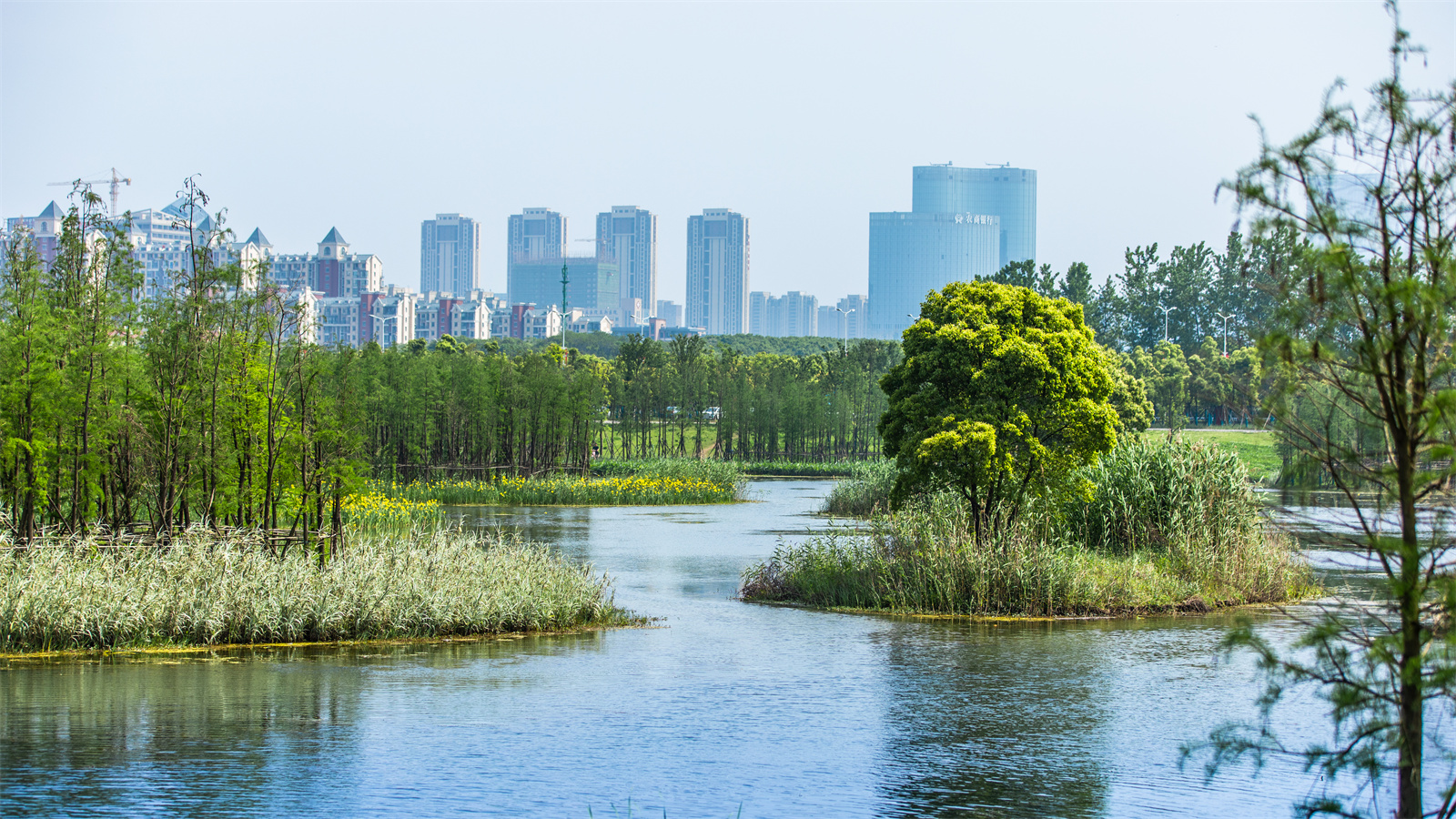
3.3一片城水交错的活力水岸
A Recreational Waterfront at the Edge between City and Nature
项目中部的水上森林在每年的季风性汛期期间都会被淹没,形成的消落带景观为市民在高密度的城区可以沉浸的感受到一片“野性”的沼泽湿地风貌。与此同时,环湖的滨水区域可以适应20年一遇的洪水淹没,并为市民提供了大量的满足休闲功能的空间,其中有自然游乐场、沙滩、涌泉和草坪。项目周边则利用了梯田人工湿地过滤和净化了城市汇入的地表径流。
The central forest on the water, which is submerged during the annual monsoon floods, provides opportunities to explore nature and a “messy,” immersive marsh experience. The waterfront at the periphery of the park, meanwhile, is designed to accommodate 20-year floods and provide a zone that can meet the recreational needs of the local population, and includes natural playgrounds, beaches, fountains and lawns. Terraced constructed wetlands are designed to filter urban runoff.
▼候鸟栖息地

▼栖息地屏障
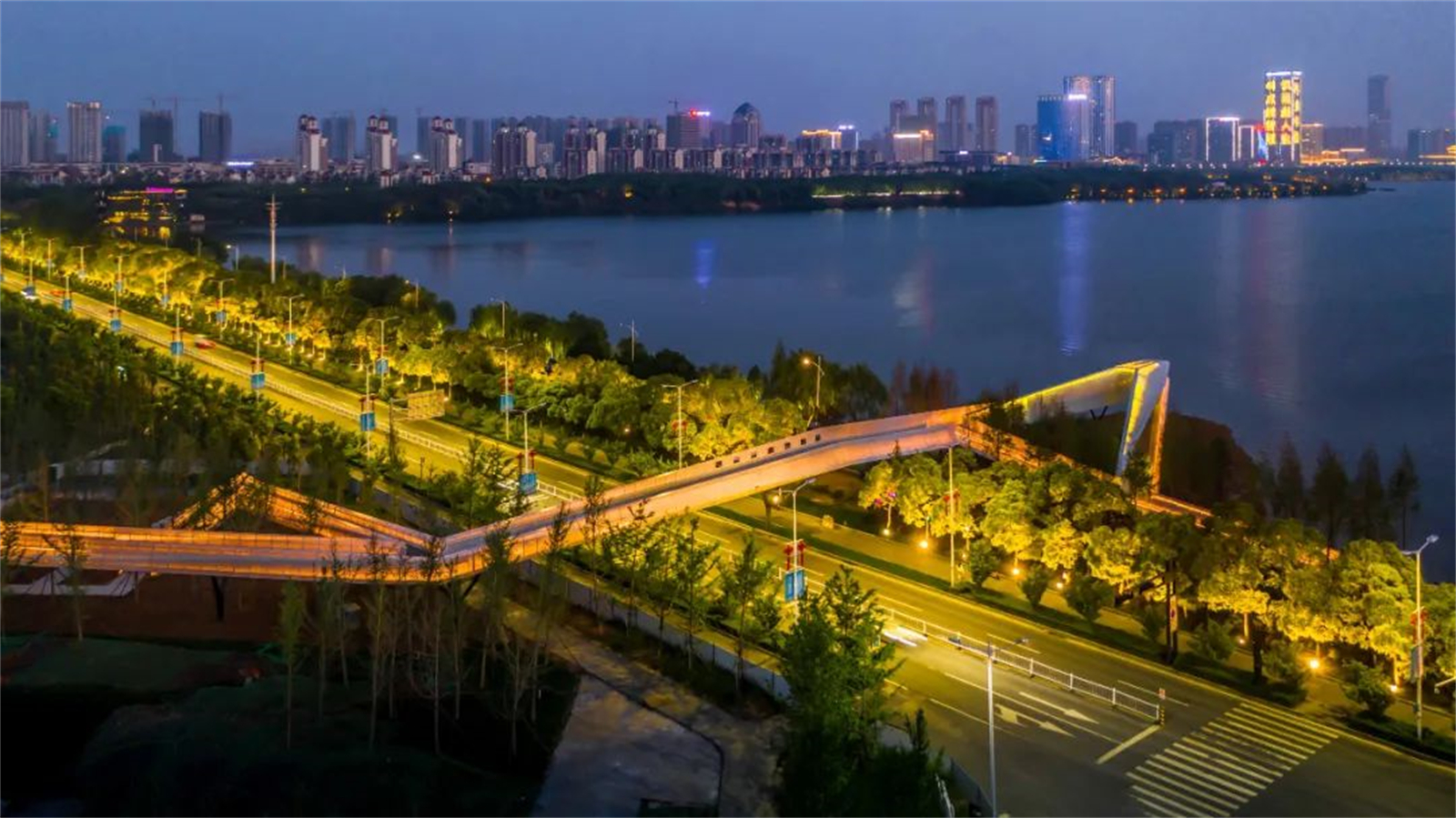
3.4一个与水交融的湿地秘境
A Flood-Resilient Boardwalk and Spots for Immersive Contact with Nature
公园周边环绕了自行车道和亲水步道,环绕的步行道和平台体系为游客提供了多处通往森林岛屿的林荫通道,形成了无数的探索湿地秘境的空间。亲水步道在20年一遇的洪水和年度的季风性洪水期间可被淹没,使湿地秘境在一年中有几天会无法进入。虽然环形人行道位于20年一遇的洪水线之下,但步道和平台皆由预制混凝土制成,并架空在地面和水面之上,浸水后可以很容易地清洗干净,而秘境中的长凳也是由耐水淹的铝材制成的。
A bike route and service road follow the park’s periphery. A network of pedestrian paths and platforms surrounds the lake and provides access to the forested isles, offering visitors myriad opportunities to explore. The boardwalk is designed to be submerged during 20-year flood events and annual monsoon floods, which can render the central part of the park inaccessible several days at a time. While the circular pedestrian and bike paths are above the 20-year flood event line, the boardwalk and platforms are made of prefabricated concrete detached from the ground or floating above water and can be easily washed clean after being submerged, as are the benches, which are made of aluminum.
▼构筑物
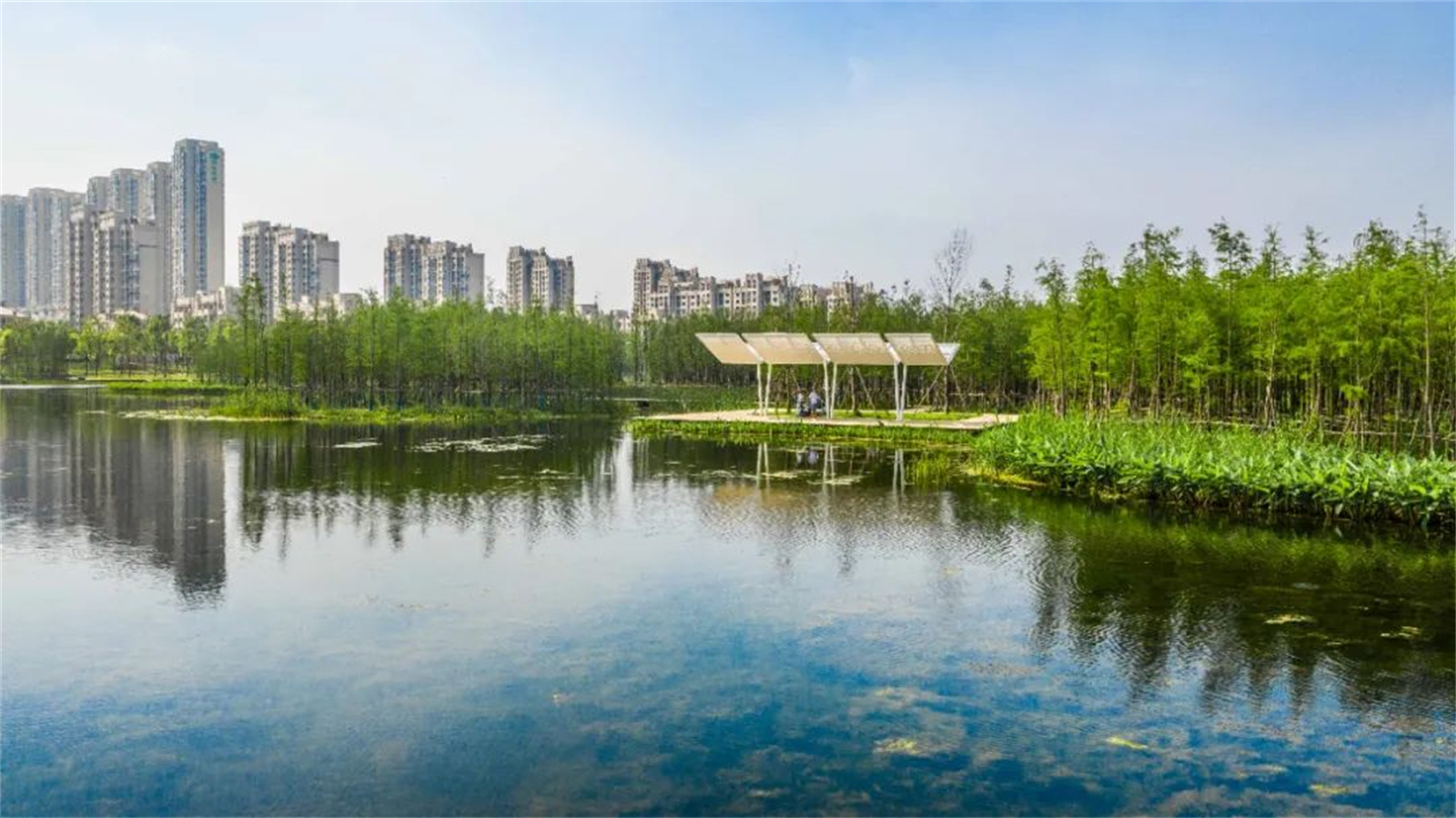
▼城市展示中心
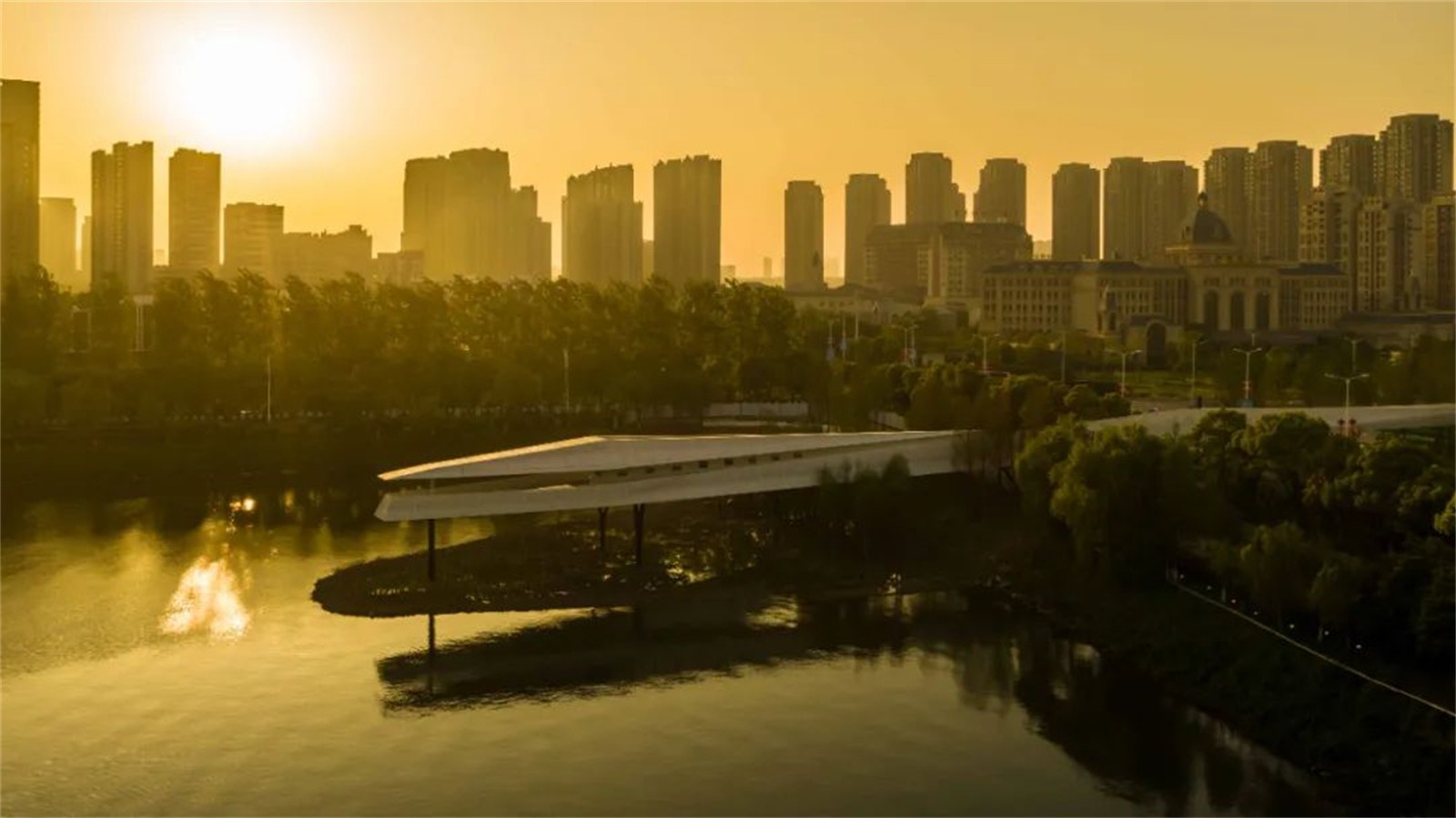

▼星水桥


3.5现代设计语境下的空间焦点
Contemporary Design and Inviting Focal Points
设计师通过精心布置的桥梁、平台、亭台楼阁和观景塔,使场地上形成了独具吸引力的人气焦点。这里的现代设计语言,为这座2000多年的古城带来了当下的审美自信和进步的气息。设计中,穿孔铝板是设施安装的主要材料,它与自然环境形成强烈对比,形成人工与自然鲜明的反差之美。在公园的主入口,一家自助餐厅与横跨六车道的步行桥融为一体,将鱼尾洲公园与邻近的艾溪湖公园紧密相连。
Bridges, platforms, pavilions and viewing towers are carefully placed to provide attractive focal points. Their contemporary design helps bring a modern taste and sense of progress to the ancient city, which dates back well over 2,000 years.. Perforated aluminum plate is the main material used for the installed structures, creating an arresting contrast with the natural setting. At the park’s main entrance, a cafeteria is integrated with an overpass across a six-lane road, connecting Fish Tail Park with the neighboring Aixi Lake Park.
▼城市与公园
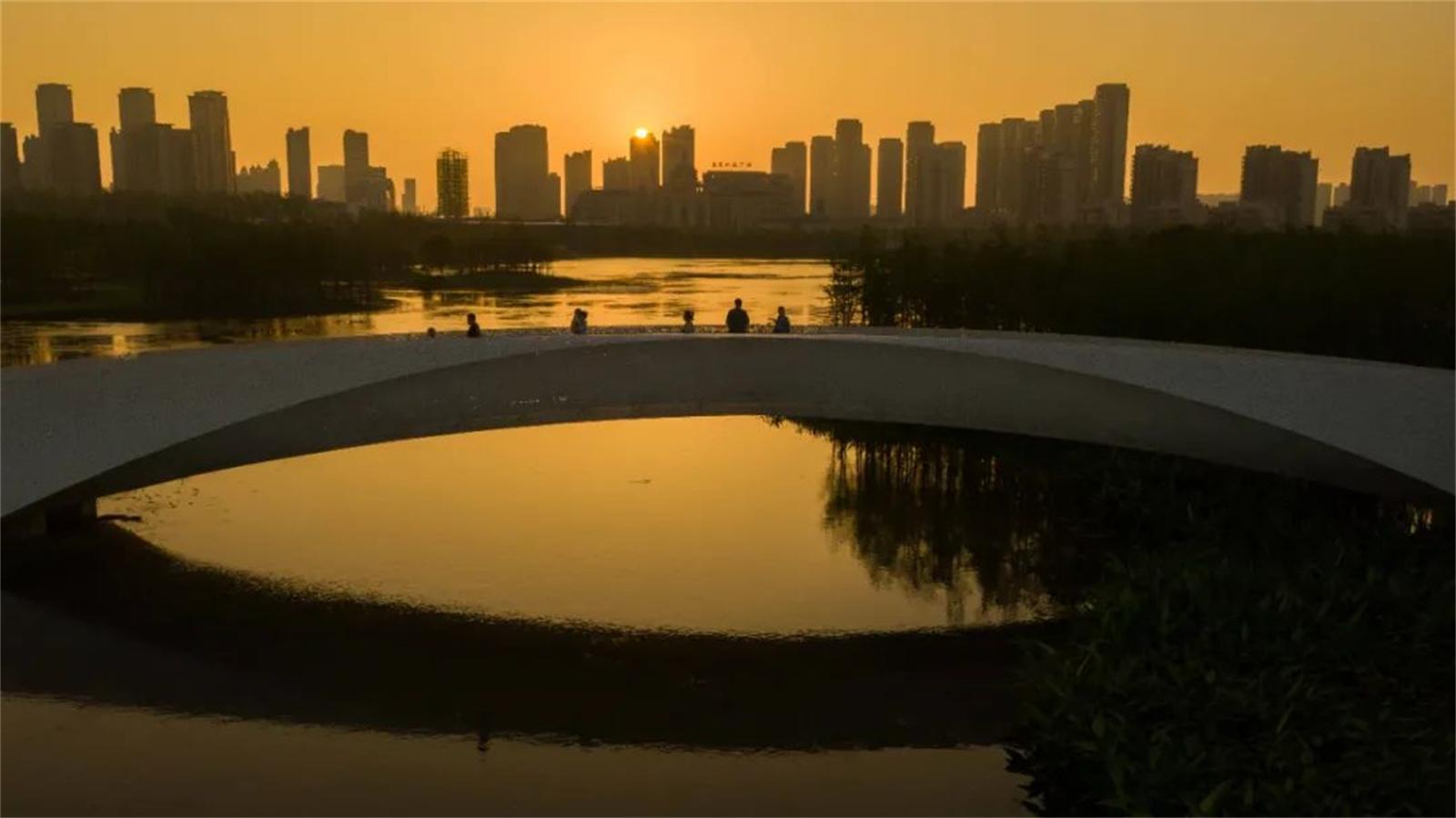
04 结论
Conclusion
事实证明,鱼尾洲公园非常成功。这片污染严重的城市垃圾场和养鱼场以每平方英尺4美元(5.3美元/平方英尺<1:6.3汇率>,360元RMB/平方米)的极低预算建成,化身成为城市中鸟类和其他野生动物的庇护所,同时也是调蓄区域雨水的城市绿洲。独具特色的公园环境让她快速成为整个城市游客最多的公园之一。国家和区域媒体广泛报道了鱼尾洲公园,这让南昌高新区也拥有了生态文明建设的样板。该公园现在是南昌地铁系统的标志性站点,并已成为周边地区发展的催化剂。
Fish Tail Park has proved to be a great success. Built at an extremely modest budget of US $4 per square foot, the heavily polluted urban dumping ground and fish farm has been transformed into an urban oasis that regulates storm water, provides habitat for birds and other wildlife, and has quickly become one of the most-visited urban parks in the entire city. Regional and national media have widely reported on Fish Tail Park, which has helped give a distinct identity to Nanchang’s New District. The park is now a landmark stop on Nanchang’s subway system, and has become a catalyst for development in the surrounding area.
项目信息
项目名称:南昌市鱼尾洲公园
项目地点:江西南昌
设计公司:土人设计
文字编辑:王慧娴
排版:王慧娴
统筹:贾会敏,田宏薇
版权声明:本文版权归原作者所有,请勿以江南电竞官网登录入口 编辑版本转载。如有侵犯您的权益请及时联系,我们将第一时间删除。
投稿邮箱:info@landscape.cn
项目咨询:18510568018(微信同号)













